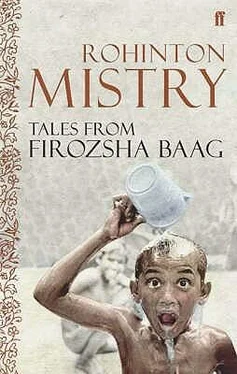Rohinton Mistry - Tales From Firozsha Baag
Здесь есть возможность читать онлайн «Rohinton Mistry - Tales From Firozsha Baag» весь текст электронной книги совершенно бесплатно (целиком полную версию без сокращений). В некоторых случаях можно слушать аудио, скачать через торрент в формате fb2 и присутствует краткое содержание. Год выпуска: 2006, Издательство: Faber & Faber, Жанр: Современная проза, на английском языке. Описание произведения, (предисловие) а так же отзывы посетителей доступны на портале библиотеки ЛибКат.
- Название:Tales From Firozsha Baag
- Автор:
- Издательство:Faber & Faber
- Жанр:
- Год:2006
- ISBN:нет данных
- Рейтинг книги:3 / 5. Голосов: 1
-
Избранное:Добавить в избранное
- Отзывы:
-
Ваша оценка:
- 60
- 1
- 2
- 3
- 4
- 5
Tales From Firozsha Baag: краткое содержание, описание и аннотация
Предлагаем к чтению аннотацию, описание, краткое содержание или предисловие (зависит от того, что написал сам автор книги «Tales From Firozsha Baag»). Если вы не нашли необходимую информацию о книге — напишите в комментариях, мы постараемся отыскать её.
Tales From Firozsha Baag — читать онлайн бесплатно полную книгу (весь текст) целиком
Ниже представлен текст книги, разбитый по страницам. Система сохранения места последней прочитанной страницы, позволяет с удобством читать онлайн бесплатно книгу «Tales From Firozsha Baag», без необходимости каждый раз заново искать на чём Вы остановились. Поставьте закладку, и сможете в любой момент перейти на страницу, на которой закончили чтение.
Интервал:
Закладка:
Then he had stooped to pull up his socks. As he was leaving he turned around, and that was when he saw what he’d least expected — two tiny tears moistening her lower lashes.
And side by side with this image that refused to go away was the sickening thought which had struck in the pit of his stomach, like nausea — the one interpretation of Bhagwan Baba’s words which he had never considered during all his rumination in the Hanging Gardens: that the trap was the one laid by Bhagwan Baba himself. To trick him into ending it this way.
He rushed through the streets like a madman, shivering, tormented and confused, glancing at his watch again and again. His breath was coming hard, he thought he would collapse. Finally, he turned into the compound and stumbled up the three steps of the C Block entrance and into the lift.
He rang the doorbell. Just one short burst. His finger slid off, the arm fell limply to his side. There was no energy to complete the prearranged signal of rings that the family members used: two short and one long.
Mother opened the door narrowly, leaving on the chain. “Trying to fool me or what, with just one ring?”
Jehangir shook his head. He clung feebly to the door, wanting to speak, but the words could not form through the panting.
“You know what time it is?”
He nodded, holding up his watch. Eight-thirty.
“This time you crossed the limit. Your father says be patient, he is just a boy. Just a boy, yes, but the boy has climbed to the roof.” She shook off his hand and slammed the door shut.
Still leaning against the door, he reached for the bell and rang it. Desperately, again and again, two short bursts and one long burst, two short and one long, over and over, as if that familiar signal would magically open the door. It remained shut. From inside the flat, silence. His arm fell. He slid to the floor and settled down to wait.
His breathing returned to normal but the wet clothes clung to him, he was very cold. During his school years, Mother used to accompany him on rainy mornings with a towel, a change of socks and shoes; at school she would dry his feet, help him into fresh socks, exchange his gumboots for the dry shoes.
He pulled his handkerchief and wiped his face, then pushed back the wet hair. The door was exposed to a gusting wind from the balcony. It made him shiver, and he shuffled into the narrow corridor sheltered by the staircase. He looked at his watch. Still eight-thirty. Must have stopped, clogged with rain water. It was a gift from Mother and Father for getting first class with distinction in his ssc exams. He hoped the neighbours would not open their doors: the news would spread through all three blocks of Firozsha Baag. Then the boys would find new names for him. He fell into a light sleep, leaning against the wall, till the soft clanking of the chain being removed from the door woke him up.
Swimming Lessons
The old man’s wheelchair is audible today as he creaks by in the hallway: on some days it’s just a smooth whirr. Maybe the way he slumps in it, or the way his weight rests has something to do with it. Down to the lobby he goes, and sits there most of the time, talking to people on their way out or in. That’s where he first spoke to me a few days ago. I was waiting for the elevator, back from Eaton’s with my new pair of swimming-trunks.
“Hullo,” he said. I nodded, smiled.
“Beautiful summer day we’ve got.”
“Yes,” I said, “it’s lovely outside.”
He shifted the wheelchair to face me squarely. “How old do you think I am?”
I looked at him blankly, and he said, “Go on, take a guess.”
I understood the game; he seemed about seventy-five although the hair was still black, so I said, “Sixty-five?” He made a sound between a chuckle and a wheeze: “I’ll be seventy-seven next month.” Close enough.
I’ve heard him ask that question several times since, and everyone plays by the rules. Their faked guesses range from sixty to seventy. They pick a lower number when he’s more depressed than usual. He reminds me of Grandpa as he sits on the sofa in the lobby, staring out vacantly at the parking lot. Only difference is, he sits with the stillness of stroke victims, while Grandpa’s Parkinson’s disease would bounce his thighs and legs and arms all over the place. When he could no longer hold the Bombay Samachar steady enough to read, Grandpa took to sitting on the veranda and staring emptily at the traffic passing outside Firozsha Baag. Or waving to anyone who went by in the compound: Rustomji, Nariman Hansotia in his 1932 Mercedes-Benz, the fat ayah Jaakaylee with her shopping-bag, the kuchrawalli with her basket and long bamboo broom.
The Portuguese woman across the hall has told me a little about the old man. She is the communicator for the apartment building. To gather and disseminate information, she takes the liberty of unabashedly throwing open her door when newsworthy events transpire. Not for Portuguese Woman the furtive peerings from thin cracks or spyholes. She reminds me of a character in a movie, Barefoot In The Park I think it was, who left empty beer cans by the landing for anyone passing to stumble and give her the signal. But PW does not need beer cans. The gutang-khutang of the elevator opening and closing is enough.
The old man’s daughter looks after him. He was living alone till his stroke, which coincided with his youngest daughter’s divorce in Vancouver. She returned to him and they moved into this low-rise in Don Mills, PW says the daughter talks to no one in the building but takes good care of her father.
Mummy used to take good care of Grandpa, too, till things became complicated and he was moved to the Parsi General Hospital. Parkinsonism and osteoporosis laid him low. The doctor explained that Grandpa’s hip did not break because he fell, but he fell because the hip, gradually growing brittle, snapped on that fatal day. That’s what osteoporosis does, hollows out the bones and turns effect into cause. It has an unusually high incidence in the Parsi community, he said, but did not say why. Just one of those mysterious things. We are the chosen people where osteoporosis is concerned. And divorcé. The Parsi community has the highest divorce rate in India. It also claims to be the most westernized community in India. Which is the result of the other? Confusion again, of cause and effect.
The hip was put in traction. Single-handed, Mummy struggled valiantly with bedpans and dressings for bedsores which soon appeared like grim spectres on his back. Mamaiji , bent double with her weak back, could give no assistance. My help would be enlisted to roll him over on his side while Mummy changed the dressing. But after three months, the doctor pronounced a patch upon Grandpa’s lungs, and the male ward of Parsi General swallowed him up. There was no money for a private nursing home. I went to see him once, at Mummy’s insistence. She used to say that the blessings of an old person were the most valuable and potent of all, they would last my whole life long. The ward had rows and rows of beds; the din was enormous, the smells nauseating, and it was just as well that Grandpa passed most of his time in a less than conscious state.
But I should have gone to see him more often. Whenever Grandpa went out, while he still could in the days before parkinsonism, he would bring back pink and white sugar-coated almonds for Percy and me. Every time I remember Grandpa, I remember that; and then I think: I should have gone to see him more often. That’s what I also thought when our telephone-owning neighbour, esteemed by all for that reason, sent his son to tell us the hospital had phoned that Grandpa died an hour ago.
The postman rang the doorbell the way he always did, long and continuous; Mother went to open it, wanting to give him a piece of her mind but thought better of it, she did not want to risk the vengeance of postmen, it was so easy for them to destroy letters; workers nowadays thought no end of themselves, strutting around like peacocks, ever since all this Shiv Sena agitation about Maharashtra for Maharashtrians, threatening strikes and Bombay bundh all the time, with no respect for the public; bus drivers and conductors were the worst, behaving as if they owned the buses and were doing favours to commuters, pulling the bell before you were in the bus, the driver purposely braking and moving with big jerks to make the standees lose their balance, the conductor so rude if you did not have the right change .
Читать дальшеИнтервал:
Закладка:
Похожие книги на «Tales From Firozsha Baag»
Представляем Вашему вниманию похожие книги на «Tales From Firozsha Baag» списком для выбора. Мы отобрали схожую по названию и смыслу литературу в надежде предоставить читателям больше вариантов отыскать новые, интересные, ещё непрочитанные произведения.
Обсуждение, отзывы о книге «Tales From Firozsha Baag» и просто собственные мнения читателей. Оставьте ваши комментарии, напишите, что Вы думаете о произведении, его смысле или главных героях. Укажите что конкретно понравилось, а что нет, и почему Вы так считаете.












